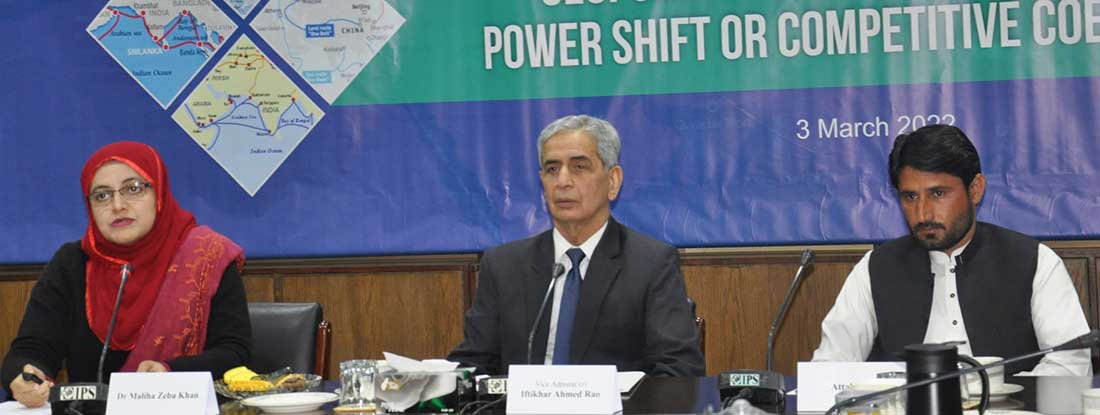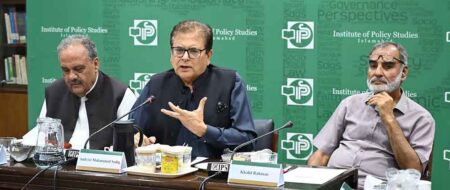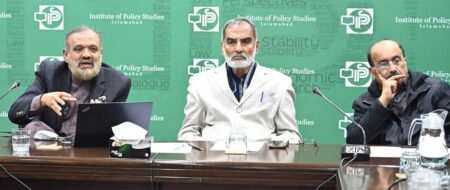‘Geopolitics of Maritime Silk Road: Power Shift or Competitive Coexistence’
“Hyper-sensitivities on the ocean routes provide states with an Impetus to adopt the policy of competitive coexistence”: Experts
Maritime Silk Road (MSR), according to China, is pristinely an economic initiative with no strategic aims. It increments the interdependence between China and the countries that are a part of this initiative. While, simultaneously, as China becomes economically more vigorous, it can significantly influence the policies of these countries through the weaponization of interdependence i.e., by exploiting the vulnerabilities of interdependence. This can provide China with certain geopolitical and geo-economic advantages in strengthening the elements of power, reshaping the structure of world order, and transforming the existing status quo. Consequently, along with the geopolitical tensions, contravening initiatives are also emerging.
To highlight security linkages and the single threat of strategic space, the US shifted the strategic construct from the Asia-Pacific policy to the Indo-Pacific policy, gave currency to regional security debate, and reorganized the QUAD. Moreover, as the US aims to contain China through a normative coalition, it initiated alternative economic projects, such as Build-Back-Better and Indo-Pacific Economic Framework, which does not include China. In addition to this, the US is also bolstering the bulwark and strategic faculties of regional countries to engender a balance of power. This will not only maintain its status quo but also counter China’s strategic aims and influence in other oceans. Although competing strategies are emerging and states are utilizing different tools to pursue hard power to achieve their national interest, there is no chance of a large-scale naval conflict, which is due to the dependence of states on maritime trade routes.
In order to understand the developing strategic scenario in the maritime domain, these trends were discussed and analyzed with a deep strategic outlook during a seminar titled ‘Geopolitics of Maritime Silk Road: Power Shift or Competitive Coexistence’, which was co-organized by IPS and Maritime Study Forum (MSF) on March 3, 2022.
The sitting was chaired by Vice Admiral Iftikhar Ahmed Rao HI (M) (retd) and graced by Commodore Jawad Akhtar Khokhar, advisor, Maritime Affairs, Ministry of Planning, Development, and Special Initiatives, as the Guest of Honor. Dr Maliha Zeba Khan, assistant professor, National University of Modern Languages (NUML), Islamabad was the keynote speaker, whereas Lokman Karadag, a research scholar from International Islamic University, Malaysia and Attal Khan, lecturer, NUML, also delivered their presentations on their respective topics. Professor Dr Fakhar ul Islam, University of Peshawar, Commodore (r) Baber Bilal Haider, and Sr IPS Associate Amanullah Khan also joined the session as discussants. At the conclusion, Vice Chairman IPS Ambassador (r) Syed Abrar Hussain delivered the vote of thanks.
In the opening remarks of the discussion, Vice Admiral Iftikhar Rao said that due to the importance of the Indian Ocean in the world economy, the primacy of MSR has increased. Linking the land and sea route is crucial because it will enable Pakistan to efficiently benefit from both sides of BRI. He further asserted the importance of the Western Indian Ocean because of the Gulf region and Suez Canal.
Dr Maliha Zeba, in her keynote speech, said that the concept of connectivity is emerging all across the globe as the world is getting connected through different roads and corridors. The connectivity through the sea is also at the center of this developing phenomenon and, ever since China has started the Belt and Road Initiative (BRI), it has started garnering even more attention. Through the MSR, China is not pursuing the realist objectives and engendering multiple channels of connectivity. Due to the MSR, China is emerging as a revisionist actor in the maritime domain and shaking the status quo of the blue order established by the US. In the military domain, traditional and non-traditional threats are prevalent. She further added that, on the economic side, the nation requires inclusive growth fixating on human security and human development. Furthermore, she highlighted the threats that MSR is facing, such as populism, hybrid warfare, and grievances of local populations.
While concluding her keynote speech, she maintained that MSR is challenging the status quo through engendering complex interdependence; however, geopolitical competition can exacerbate non-traditional security challenges. She also outlined that competitive coexistence is going to remain a major feature of the MSR.
Commenting on Dr Maliha’s keynote speech, Rao agreed to the notion of competitive coexistence, indicating that, as an outcome of Chinese investments in different economic projects and initiatives in various countries, the West is now being forced to establish an alternate way to economic and constructive development. He further commented on how the Indian perceptions of ‘no foreign interference’ in the Indian Ocean during the Cold War changed to the stance of allowing foreign presence in the Indian Ocean only for a positive cause. This shift happened after the Cold War and the emergence of India. The influence and interests of the US in keeping India a net security provider in the region are closely related to the hegemonic designs of India. He further stressed that, for these reasons, Pakistan must keep a careful eye on the developments in the Ocean.
Lokman Karadag pointed out how the naval activities of China in the western Pacific were creating security issues and geopolitical implications. According to the speaker, the Maritime Silk Road Initiative cannot survive unless the security issues including regional disputes in the East and the South China Sea are sorted out. While presenting his views on the future of MSR through the lens of regional power politics and international efforts to contain China, he also discussed the structural changes that are happening due to the power transition.
Attal Khan also shared his findings on the transformation of the Arctic Ocean and Polar Trade Route. He also reflected on how the Northern Sea Route has become an alternative to Suez Canal, cutting the trade distance between the Pacific Ocean and Europe by 9700 km. Based on this, he explored the geo-economics of the Arctic, Arctic shipping routes, and international implications & limitations to achieving the maximum outcome of the Polar Silk Road.
Cdre Baber Bilal also presented his take on the subject stating that the Chinese are setting up their stations all around the globe i.e., in the Pacific Ocean, Atlantic Ocean, Arctic Ocean, Indian Ocean, and the Antarctica region. He further commented on how China had exploited all the key sea routes for their trade and economic incentives and is investing in all the countries having significant ports, including Myanmar, Pakistan, Bangladesh, Sri Lanka, Oman, Djibouti, etc.
He maintained that Eastern ports of China would continue to use the route through Malacca Strait and keep their presence in the South China Sea. While, at the same time, the Western region of China would use the land route towards ports. It is a business-wise frame of work and China cannot divert its business from these ports to other ports. The role of navy and security challenges automatically comes with it. The navy is made to protect the trade and not otherwise.












